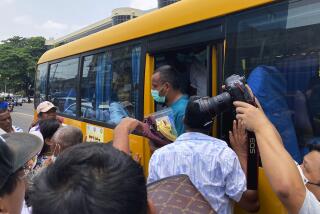Rights activists criticize China for hosting Myanmar leader
Reporting from Beijing and New Delhi — Once again, the head of a nation viewed as a pariah in the West had come to China to court favor, legitimacy and money, eliciting criticism that Beijing is coddling repressive regimes.
This time it was Senior Gen. Than Shwe, leader of the generals who rule Myanmar. The 77-year-old on Wednesday received a red-carpet welcome at Beijing’s Great Hall of the People.
Chinese President Hu Jintao spoke effusively about the 60th anniversary of relations between China and Myanmar, also known as Burma, signaling that Beijing would help protect its ally against international pressure.
“China respects sovereignty and territorial integrity of Myanmar, understands and supports the Myanmar government’s efforts for national reconciliation,” Hu said, according to comments carried by the official New China News Agency. “The policy will remain unchanged regardless of changes of international situation.”
Than Shwe, an elusive figure who rarely speaks to journalists, mumbled a few words about neighborly relations before reporters were ushered out of the conference hall.
The top items on the agenda were believed to be Myanmar’s coming elections and its struggle against armed tribal groups along the countries’ shared border, endeavors for which the ruling generals need the backing of one of its few international friends.
Myanmar also needs Beijing’s backing at the United Nations at a time when Washington is increasingly concerned that the nation is following North Korea’s path and trying to develop nuclear weapons.
“The trip is designed to shore up Beijing’s support,” said Adrian Vickers, professor of Southeast Asian studies at Australia’s University of Sydney. “It’s really Beijing’s money that keeps bankrolling the current regime.”
Myanmar’s elections, scheduled for Nov. 7, are the nation’s first in 20 years. The process has been widely criticized because of restrictions on campaigning and participating that ensure the continuity of the regime, while conferring an aura of legitimacy. Nobel Peace Prize laureate Aung San Suu Kyi is barred from running.
Beijing, despite its discomfort with the electoral process, pressed the generals to hold the vote out of concern that Myanmar’s ossified political system could endanger China’s business interests and worsen unrest along their border.
China has extensive economic interests in Myanmar: dams, fisheries, mines, oil and gas, construction. It is also building twin pipelines, for oil and natural gas, extending from southwestern China’s Yunnan province to the Indian Ocean.
“What China really needs from Burma is a route to the sea,” said a Beijing-based diplomat, who asked not to be quoted by name.
Fresh on the heels of a trip last month to China by North Korean leader Kim Jong Il, Than Shwe’s visit is coming under attack from human rights advocates who accuse Beijing of propping up some of the world’s most repressive regimes.
“China both wants to profit from Burma and distance itself from Burma’s unstable military rule,” Sophie Richardson, acting Asia director of Human Rights Watch, said in a statement before Than Shwe’s visit. “If the Chinese government doesn’t fundamentally alter its approach to Burma, it risks burnishing its reputation as a patron of abusive regimes.”
Myanmar also will be looking for help from Beijing in fighting armed groups that operate in the border areas, a conflict that at times has led refugees to flee into China. A Myanmar government plan to co-opt minority ethnic groups and turn them into armed border guards has fallen short.
“They have a plan to eliminate all these armed groups,” said Nawdin Lahpai, Thailand-based editor of the Kachin News Group, a dissident publication. “But this has failed. They need support from China to limit the armed groups along the border.”
Than Shwe hasn’t visited China since 2003. The tour follows a trip to Myanmar by Chinese Premier Wen Jiabao in June, when the two countries signed 15 documents covering natural gas pipeline, hydroelectric power and grant aid.
The New China News Agency says China is Myanmar’s third-largest trading partner and investor, with two-way trade in 2009 of $2.9 billion. But much of the border activity is illegal or unreported, so the real figure is probably far higher, analysts said.
Demick reported from Beijing and Magnier from New Delhi.
More to Read
Sign up for Essential California
The most important California stories and recommendations in your inbox every morning.
You may occasionally receive promotional content from the Los Angeles Times.










